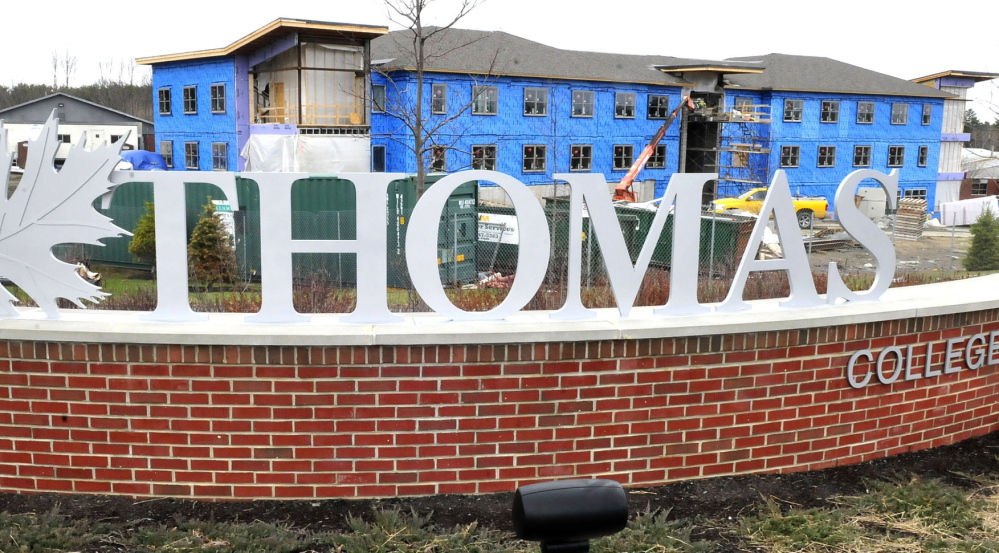A federal loan program that serves hundreds of thousands of needy students expired Sept. 30 despite attempts from legislators, including U.S. Sen. Susan Collins, to extend it.
About 700,000 students throughout the country, including 4,000 in Maine, and among them more than 450 in central Maine schools, now receive financial aid from the Perkins Loan Program, the oldest federal student loan program in the country.
The expired program leaves 79 students at Thomas College in Waterville, 73 students at the University of Maine at Augusta, and 313 students at the University of Maine at Farmington without the federal loans in future years.
Just under 2,800 students in the University of Maine system received Perkins loans in 2017, according to data from Dan Demeritt, executive director of public relations. On average, the loan amount is about $1,700.
The program provided federal loans of up to $5,500 each year at 5 percent interest to undergraduate students with exceptional financial need, with a cap at $27,500. Eligible graduate and professional students could receive up to $8,000 per year with a cap of $60,000. The student also had to be attending one of about 1,500 schools that participated in the program, as the schools are the lenders. Unlike unsubsidized Stafford loans, which are available to any student, loans from the Perkins program don’t accrue interest while the student is in school.
The program has provided more than $28 billion in loans through nearly 26 million awards to students across the United States, according to a news release from the office of U.S. Sen. Tammy Baldwin, D-Wis., who co-sponsored the legislation with Collins to extend the program, as well as Sens. Rob Portman, R-Ohio, and Bob Casey, D-Pa.
“In Maine, more than 4,000 students received a Perkins Loan last year, providing nearly $8.6 million in aid,” Collins said a news release, which detailed bipartisan legislation to extend the program. “The Perkins Loan Program serves as a critical resource for students to fill gaps beyond what is available through the Department of Education’s Direct Loan Program and a family’s ability to pay.”
The proposed two-year extension would give students in Maine and beyond “critical certainty” required to plan for paying for higher education, she said.
Baldwin’s request to pass the extension legislation was blocked Sept. 28, despite the introduction of companion legislation and further support from both Republican and Democratic lawmakers and organizations such as the Association of American Universities, the National Education Association and the Association of Jesuit Colleges and Universities.
“Maine’s public universities are making critical investments in new programs that meet state workforce needs as well as increased financial aid resources that provide our students with the support and structure they need to complete their degree programs and join the Maine workforce affordably and with the least amount of debt,” said James H. Page, Chancellor of the University of Maine System. “We appreciate every effort made in Maine and Washington, especially the recent legislation sponsored by Senator Collins to extend the authorization of the Perkins program that benefits our students.”
The public college system also recently announced that it is eliminating tuition and fees at four campuses next fall for first-year Maine students who qualify for federal Pell grants, which are need-based. The financial aid will be available at the University of Maine at Augusta, the University of Maine at Presque Isle, the University of Maine at Fort Kent and the University of Maine at Machias. Students still will have to pay for room and board, as well as books and other costs.
Colby College in Waterville has seen a “steep decrease” in Perkins loan recipients since the expiration was announced two years ago, according to Director of Communications Kate Carlisle. She did not give a specific number of students using the program but said it was “just several students.”
“Colby is committed to providing 100 percent of the demonstrated financial need of all admitted students — without student loans,” Carlisle said in an email.
Critics of the loan program have said it only adds to an already complex financial aid system, piling on yet another repayment plan and another lender for students to keep track of. The program was extended previously in 2015 amid talks to reauthorize the Higher Education Act by the end of those two years, but that hasn’t happened.
Madeline St. Amour — 861-9239
mstamour@centralmaine.com
Twitter: @madelinestamour
Send questions/comments to the editors.



